We may not have the course you’re looking for. If you enquire or give us a call on 01344203999 and speak to our training experts, we may still be able to help with your training requirements.
Training Outcomes Within Your Budget!
We ensure quality, budget-alignment, and timely delivery by our expert instructors.
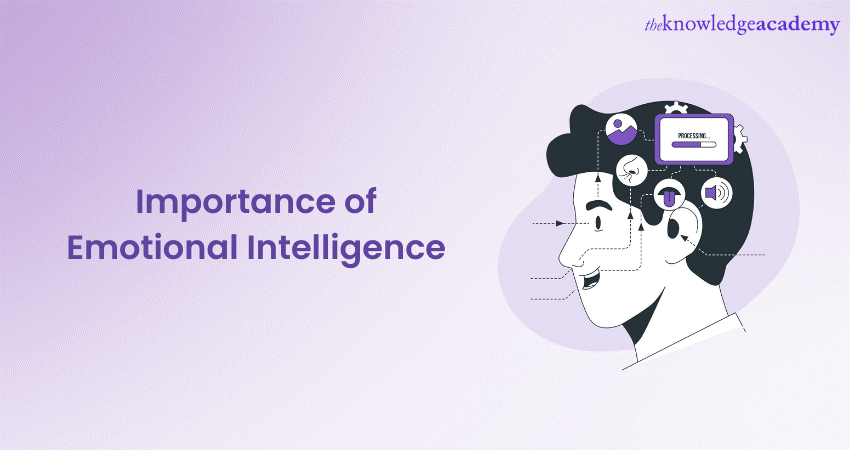
In today's fast-paced and interconnected world, Emotional Intelligence (EI) has emerged as a crucial skill that significantly impacts personal and professional success. This is why understanding the Importance of Emotional Intelligence is of utmost importance. It can empower individuals to navigate emotions effectively, build stronger relationships, and make better decisions.
According to Statista, 80 per cent of millennials reported learning about Emotional Intelligence via coaching and training sessions as the most effective method. These statistics clearly reflect that individuals today are aware of the Importance of Emotional Intelligence.
However, if you are not yet aware of EI’s importance, this blog is for you. In this blog, you will learn about EI and the Importance of Emotional Intelligence. So, let’s delve deeper to learn more!
Table of Contents
1) Understanding Emotional Intelligence
a) Self-awareness
b) Emotional regulation
c) Empathy
d) Social skills
e) Motivation
2) The significance of Emotional Intelligence
3) Conclusion
Understanding Emotional Intelligence
Emotional Intelligence is an inherent aspect of human behaviour that influences how we perceive, understand, and manage emotions in ourselves and others. It plays an important role in shaping our relationships, decision-making, and overall well-being.
It also includes skills such as emotional awareness, which makes it easy to solve complex problems, enhancing interpersonal communications and helps in conflict resolution. With the help of Emotional Intelligence skills, it becomes easy to regulate emotions at a time of crisis and think about innovative and creative solutions to get out of those complex situations.
Let's discuss some of the key reasons why harnessing Emotional Intelligence skills is important:
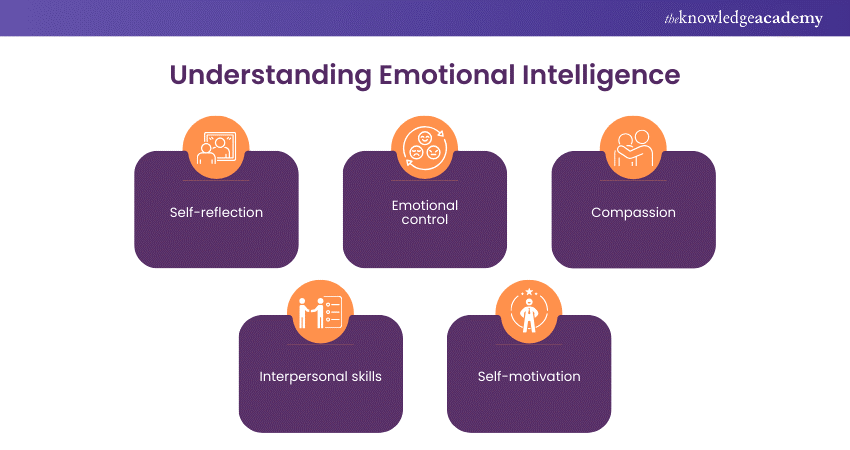
Self-awareness
Self-awareness is the ability to understand one’s emotions and feelings. This also involves understanding one’s strengths, weaknesses, and points which triggers emotions. If you are self-aware, you will be able to investigate why you might be feeling that way. By being aware of our emotions, we can better manage them and respond to situations with clarity and composure.
Emotional regulation
Emotional Intelligence empowers us to regulate our emotions effectively. It means being in control of our emotional responses and avoiding any kind of impulsive reactions. Emotionally intelligent individuals can handle stress and challenges with resilience and find constructive ways to cope with difficult emotions.
Regulating your emotions can also help you to avoid any complex or negative situation. Rather than acting impulsively, you can become self-aware and understand the situation. This gives you the control to control any negative situation to go out of hand and become more complex and stressful.
For example: You can get agitated over the behaviour of any of your colleagues in your workplace. However, acting impulsively because of your negative emotions will have the opposite effect of the outcome that you expected. Therefore, delaying response due to highly stressful or emotionally triggering situations will help you improve your mental health and emotional well-being.
Unlock your potential and invest in your growth with our Personal Development Course today!
Empathy
Empathy is the aptitude to understand and share the feelings and perspectives of others. It allows us to connect with others on a deeper level and show compassion and support. Empathy fosters stronger relationships and promotes a sense of unity and understanding. It is an important skill to incorporate as it greatly helps while negotiating with businesses and customers, as it will help you to anticipate the opposite party’s needs and reactions.
In the workplace having empathy is a significant factor, to create a positive work environment. It is observed that emotionally intelligent managers are better leaders and they are better at managing complex and stressful situations. They also act as a good example for the rest of their team members and employees. They encourage them to maintain a positive attitude in the workplace and be empathic towards each other.
Social skills
Emotionally intelligent individuals excel in social situations. They have strong interpersonal skills, communicate effectively, and build rapport with others. These social competencies enable them to lead and collaborate successfully within various settings.
Motivation
Emotional Intelligence tends to drive intrinsic motivation. People with high Emotional Intelligence are self-driven and strive for personal growth and achievement. They are resilient in the face of setbacks and maintain a positive outlook, inspiring others around them.

The significance of Emotional Intelligence
Emotional Intelligence is a fundamental aspect of human behaviour that holds immense importance in shaping our lives and interactions with others. It goes beyond mere intellect and skills, as it involves understanding and managing emotions, both our own and those of others. Let's explore the Importance of Emotional Intelligence and the impact it has on our personal and professional lives:
Enhancing relationships
The importance of Emotional Intelligence can be seen in relationships. Being emotionally intelligent enhances our relations with others, whether in personal or professional settings. By developing Emotional Intelligence, we can build deeper connections, foster trust, and create more meaningful interactions with those around us. Here's why is Emotional Intelligence important in enhancing relationships:
a) Empathy and understanding: Emotionally intelligent individuals have a heightened sense of empathy, allowing them to understand and relate to the emotions of others.
b) Effective communication: Emotional Intelligence enables better communication by recognising and managing our emotions during conversations.
c) Conflict resolution: Emotionally intelligent individuals can approach conflicts calmly and composedly, seeking solutions that benefit both parties.
d) Building trust and support: Trust is a foundation of strong relationships and Emotional Intelligence fosters trustworthiness.
e) Managing emotions responsibly: Emotional Intelligence helps us regulate our emotions, preventing us from reacting impulsively in challenging situations.
f) Expressing gratitude and appreciation: Emotionally intelligent individuals recognise the value of expressing gratitude and appreciation in relationships.
g) Flexibility and adaptability: Emotional Intelligence enables individuals to be flexible and adaptable in relationships.
h) Conflict prevention: By being emotionally aware, emotionally intelligent individuals can identify the sources of conflict and take proactive measures to prevent them.
Developing Emotional Intelligence allows us to create deeper connections and cultivate more fulfilling and supportive relationships with those around us.
Effective communication
Effective communication is a cornerstone of successful interactions and relationships. Developing strong communication skills is essential for conveying thoughts, emotions, and ideas clearly and fostering understanding between individuals. Let’s explore why is Emotional Intelligence important when it comes to effective communication:
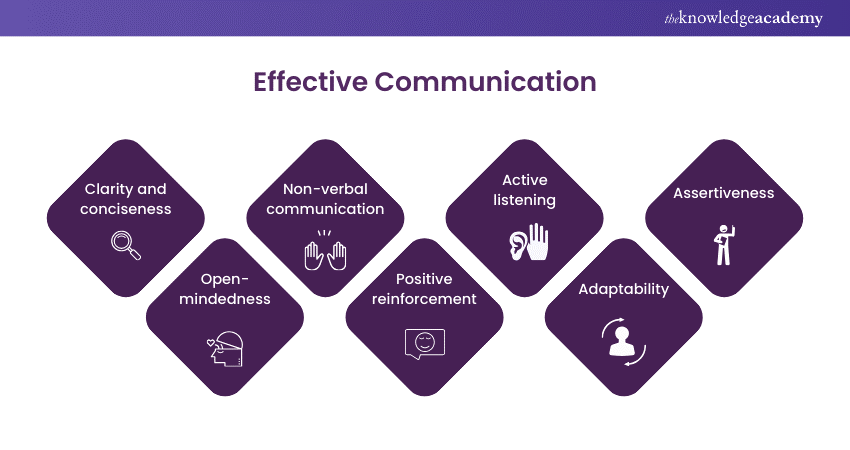
a) Clarity and conciseness: Emotionally intelligent individuals communicate clearly and concisely to avoid misunderstandings and confusion.
b) Non-verbal communication: People with high EI pay attention to non-verbal cues like body language and gestures, which often convey underlying emotions.
c) Active listening: They seek to understand the perspectives and feelings of others to respond more thoughtfully.
d) Assertiveness: High Emotional Intelligence helps express your thoughts and feelings assertively, respecting your own needs and boundaries while considering others.
e) Open-mindedness: It also allows people to be open to different viewpoints and ideas, nurturing an environment of collaboration and mutual respect.
f) Positive reinforcement: High EI encourages and acknowledges others' contributions and efforts, reinforcing positive behaviour.
g) Adaptability: People with high Emotional Intelligence adapt various communication styles to suit different audiences and situations for more effective outcomes.
Effective communication is essential for building meaningful connections and promoting understanding in both personal and professional relationships. By honing our communication skills, we can create a more harmonious and collaborative environment with those around us.
Master the art of active listening and enhance your communication skills with our Active Listening Skills Training – Sign up today!
Conflict resolution
Conflict resolution is a crucial skill that allows individuals to address disagreements and disputes constructively and harmoniously. Successful conflict resolution promotes understanding, fosters collaboration, and strengthens relationships. Here are some key aspects of the Importance of Emotional Intelligence when it comes to effectively resolving conflicts:
a) Stay calm and composed: Keep emotions in check during the resolution process to maintain a rational approach.
b) Identify the core issue: Clearly define the root cause of the conflict to address the underlying problem.
c) Active listening: Listen attentively to the viewpoints and concerns of all parties indulged in the conflict.
d) Empathy and understanding: Show empathy towards the emotions and viewpoints of others to build rapport.
e) Focus on the issue: Avoid personal attacks and concentrate on addressing the problem at hand.
f) Seek common ground: Identify shared interests and goals to find solutions that benefit all parties.
g) Collaborate on solutions: Work together to brainstorm and find mutually agreeable resolutions.
h) Be open to compromise: Be willing to make concessions to reach a resolution that satisfies everyone.
i) Communicate assertively: Express your feelings and concerns clearly and respectfully.
j) Apologise and forgive: When appropriate, apologise for any mistakes and be willing to forgive others.
k) Learn from experience: Use conflicts as opportunities for growth and learning.
Conflict resolution is a valuable skill that promotes harmony and cooperation in relationships. By employing effective Conflict Management Strategies, individuals can navigate disagreements gracefully and build stronger, more resilient connections with others.
Stress management
Stress is an inevitable part of life, but how we manage it can significantly impact our overall well-being. Stress Management involves adopting healthy coping strategies to deal with the pressures and challenges we encounter effectively.
By incorporating Stress Management Techniques into our lives, we can reduce stress and enhance our physical and psychological health. Here are some key aspects of the Importance of Emotional Intelligence when it comes to effective stress management:
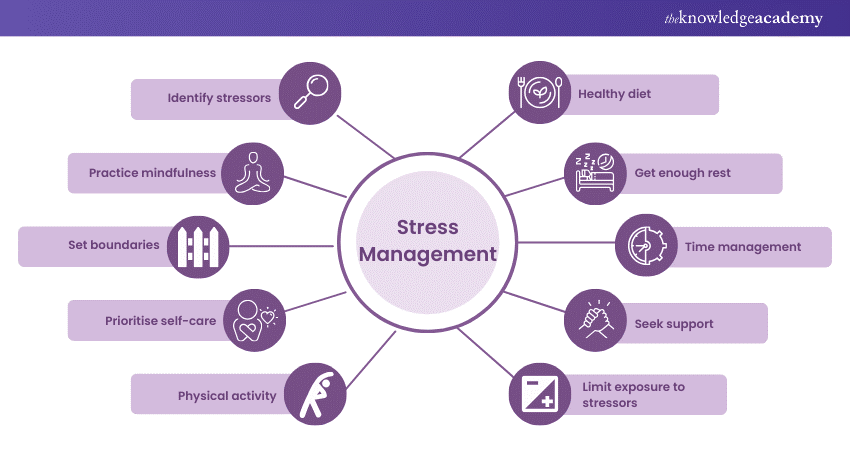
a) Identify stressors: Recognise the sources of stress in your life and understand how they affect you.
b) Practice mindfulness: Engage in activities like meditation and deep breathing to stay present and reduce anxiety.
c) Set boundaries: Establish clear boundaries in your personal as well as professional life to avoid becoming overwhelmed.
d) Prioritise self-care: Make time for activities that bring joy and relaxation, such as hobbies and spending time with loved ones.
e) Physical activity: Regularly exercise to release endorphins, which can help eliminate stress and boost mood.
f) Healthy diet: Eat a balanced diet, including fruits, vegetables, and whole grains, to support your body during stressful times.
g) Get enough rest: Ensure you get sufficient sleep each night to recharge and maintain emotional resilience.
h) Time management: Organise and prioritise your tasks to avoid feeling overwhelmed by a busy schedule.
i) Seek support: Talk to friends, family, or a professional about your stressors to gain perspective and guidance.
j) Limit exposure to stressors: When possible, avoid situations that trigger stress or negative emotions.
Take charge of stress and cultivate resilience with our Stress Management Courses – Sign up now!
Leadership and teamwork
Effective leadership and teamwork are essential for the success of any organisation or group. Strong leadership provides direction, motivation, and guidance to individuals. At the same time effective teamwork harnesses the collective skills and talents of team members to achieve common goals. Here are key aspects of leadership and teamwork:
A good leader establishes a clear vision and sets achievable goals for the team. Let’s explore the Importance of Emotional Intelligence when it comes to effective leadership:
a) Communication: Effective communication is vital for conveying expectations, providing feedback, and inspiring the team.
b) Decision-making: Leaders must make informed and timely decisions, considering input from team members when necessary.
c) Delegation: Delegating tasks based on individual strengths empowers team members and optimises productivity.
d) Empowerment: Encouraging autonomy and providing support allows team members to excel in their roles.
e) Conflict resolution: Leaders address conflicts promptly, fostering a positive team environment and maintaining harmony.
Effective leadership and teamwork are interdependent and critical for achieving organisational goals. By cultivating strong leadership qualities and fostering a collaborative team culture, bussinesses can achieve their full potential and achieve success.
Personal growth and well-being
Personal growth and well-being are essential to leading a fulfilling and meaningful life. It involves continuous self-improvement, exploring new opportunities, and prioritising mental and physical health. Here are key elements of personal growth and well-being:
a) Self-awareness: Reflect on your strengths, weaknesses, and values to better understand yourself.
b) Setting meaningful goals: Establish realistic and inspiring goals that align with your aspirations.
c) Continuous learning: Embrace learning opportunities and seek knowledge to expand your horizons.
d) Embracing change: Embrace change as a catalyst for growth and adaptability.
e) Resilience: Build resilience to bounce back from setbacks and overcome challenges.
f) Positive mindset: Develop a positive outlook on life, focusing on gratitude and optimism.
g) Healthy habits: Prioritise physical well-being through regular exercise and a balanced diet.
h) Mental well-being: Prioritise mental health by managing stress and seeking support when needed.
i) Work-life balance: Strive to maintain a healthy balance between work and personal life.
j) Self-care: Make time for self-care activities that rejuvenate and nurture your well-being.
k) Mindfulness: Practice mindfulness to stay in the present and reduce anxiety.
Personal growth and well-being are interconnected, nurturing each other. By prioritising self-awareness and a positive mindset, individuals can lead fulfilling lives while taking care of their mental and physical health.
Empathy and social impact
Empathy is a powerful human trait that drives compassion and understanding for others. It plays a massive role in developing a positive social impact, fostering a more empathetic and caring society. Here are some key aspects of the Importance of Emotional Intelligence when it comes to empathy and its social impact:
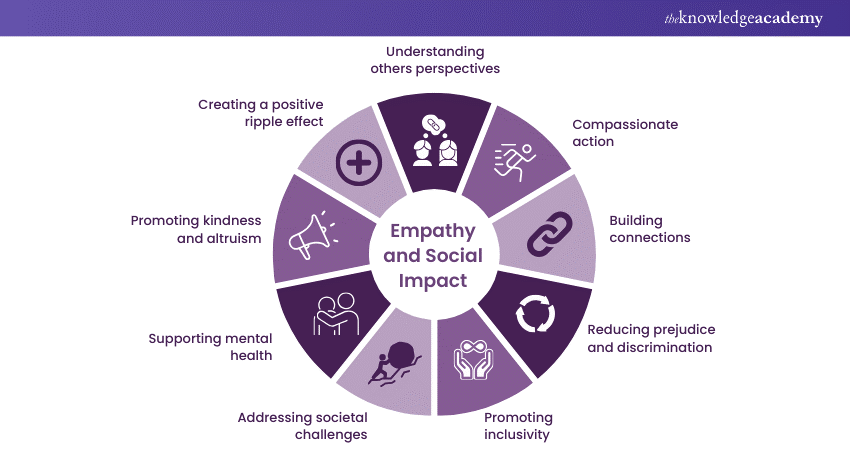
a) Understanding others' perspectives: Empathy allows us to put ourselves in others' shoes, understanding their feelings and experiences.
b) Compassionate action: Empathetic individuals are more likely to take compassionate actions to help those in need.
c) Building connections: Empathy strengthens interpersonal connections, promoting a sense of unity and community.
d) Reducing prejudice and discrimination: Empathy helps challenge stereotypes and reduces prejudice and discrimination.
e) Promoting inclusivity: By understanding and embracing diverse perspectives, empathy fosters inclusivity.
f) Addressing societal challenges: Empathetic individuals are motivated to address social issues and contribute to positive change.
g) Supporting mental health: Empathetic support can significantly impact someone's mental well-being.
h) Promoting kindness and altruism: Empathy encourages acts of kindness and selflessness towards others.
i) Creating a positive ripple effect: Acts of empathy can inspire others to do the same. They can create a positive ripple effect in society.
Empathy has a profound social impact, transforming how we interact with others. It also helps build a more compassionate and understanding world.
Resilience and adaptability
Resilience and adaptability are essential qualities that enable individuals to navigate through life's challenges and uncertainties with grace and strength. Resilience allows us to bounce back from setbacks, while adaptability empowers us to adjust and thrive in ever-changing circumstances. Here are some key aspects of the Importance of Emotional Intelligence when it comes to resilience and adaptability:
a) Embracing change: Resilient individuals embrace change as an opportunity for growth and learning.
b) Positive mindset: Resilience is reinforced by a positive outlook and the belief in one's ability to overcome obstacles.
c) Coping with adversity: Resilient individuals develop effective coping strategies to deal with stress and adversity.
d) Flexibility: Adaptability involves being flexible and open to new ideas and approaches.
e) Problem-solving skills: Adaptable individuals are skilled at finding creative solutions to new challenges.
f) Managing uncertainty: Resilience and adaptability help individuals manage uncertainty and unpredictability.
g) Maintaining composure: Adaptable individuals remain composed and level-headed in uncertain situations.
h) Embracing new opportunities: Resilient and adaptable individuals learn from past experiences and seize new opportunities for personal and professional growth.
i) Balancing stability and change: Resilience and adaptability strike a balance between stability and embracing change.
Resilience and adaptability are indispensable traits that empower individuals to face life's ups and downs with strength and flexibility. By cultivating these qualities, one can embrace change, overcome challenges, and thrive in an ever-evolving world.
Emotional well-being in relationships
Emotional well-being is a critical aspect of maintaining healthy and fulfilling relationships. It involves understanding and managing emotions in oneself and others to create a supportive and nurturing relationship environment. Here are some key elements of the Importance of Emotional Intelligence and emotional well-being in relationships:
a) Emotional awareness: Emotionally well-being individuals are aware of one's own emotions and understand their impact on the relationship.
b) Emotional regulation: Regulation of one’s emotions helps manage situations in a healthy way to avoid emotional outbursts and conflicts.
c) Empathy and compassion: Individuals with high EI show kindness and compassion towards their partner's feelings and experiences.
d) Effective communication: Individuals with high EI communicate emotions and needs clearly and actively listen to their partner.
e) Support and validation: They provide emotional support and validate their partner's feelings and experiences.
f) Respect and boundaries: Emotionally stable people respect each other's boundaries and personal space.
g) Conflict resolution: People with high EI address conflicts constructively and find resolutions that honour both partners' emotions.
h) Shared emotional growth: They support each other's emotional growth and personal development.
i) Managing stress together: People with high Emotional Intelligence help each other cope with stress and challenges in a supportive manner.
Cultural sensitivity and diversity
Cultural sensitivity and diversity awareness are essential in today's interconnected world. This fosters inclusivity and understanding among individuals from diverse backgrounds. Embracing cultural differences and respecting various traditions and beliefs create a harmonious and accepting society. Here are some key aspects of the Importance of Emotional Intelligence when it comes to cultural sensitivity and diversity:
a) Open-mindedness: Be open to different cultural perspectives and valuing diversity.
b) Respect for cultural practices: Respect and appreciate the customs and traditions of other cultures.
c) Avoiding stereotypes: Avoid generalisations and stereotypes based on cultural backgrounds.
d) Effective communication: Be mindful of cultural nuances during communication to prevent misunderstandings.
e) Inclusivity: Embrace diversity and ensure everyone feels valued and included.
Conclusion
We hope you read and understood the Importance of Emotional Intelligence from this blog. It is a vital skill that empowers individuals to understand and manage emotions effectively, fostering healthier relationships and personal growth. By cultivating self-awareness, empathy, and emotional regulation, we can navigate life's complexities with resilience and positively impact those around us.
Embrace Emotional Intelligence and elevate your relationships with our Emotional Intelligence Training – Sign up now!
Frequently Asked Questions

Emotional Intelligence plays an important role in leadership. Individuals possessing Emotional Intelligence skills help in building strong professional as well as interpersonal relationships, foster positive work environment, encourage teamwork and empathy towards one other.

Emotional Intelligence allows you to communicate with your colleagues and peers effectively without any misunderstandings. It helps you to navigate any workplace with empathy and understanding so that it is easier to build strong professional relationships.

The Knowledge Academy takes global learning to new heights, offering over 30,000 online courses across 490+ locations in 220 countries. This expansive reach ensures accessibility and convenience for learners worldwide.
Alongside our diverse Online Course Catalogue, encompassing 17 major categories, we go the extra mile by providing a plethora of free educational Online Resources like News updates, Blogs, videos, webinars, and interview questions. Tailoring learning experiences further, professionals can maximise value with customisable Course Bundles of TKA.

The Knowledge Academy’s Knowledge Pass, a prepaid voucher, adds another layer of flexibility, allowing course bookings over a 12-month period. Join us on a journey where education knows no bounds.

The Knowledge Academy offers various Personal Development courses, including Exceptional Customer Service Training, Active Listening Training, and Organisational Skills. These courses cater to different skill levels, providing comprehensive insights into Body Language in Customer Service.
Our Business Skills blogs cover a range of topics related to Customer Service, offering valuable resources, best practices, and industry insights. Whether you are a beginner or looking to advance your Customer Service skills, The Knowledge Academy's diverse courses and informative blogs have you covered.
Upcoming Business Skills Resources Batches & Dates
Date
 Emotional Intelligence Training
Emotional Intelligence Training
Fri 10th Jan 2025
Fri 14th Mar 2025
Fri 9th May 2025
Fri 11th Jul 2025
Fri 12th Sep 2025
Fri 14th Nov 2025







 Top Rated Course
Top Rated Course


 If you wish to make any changes to your course, please
If you wish to make any changes to your course, please


